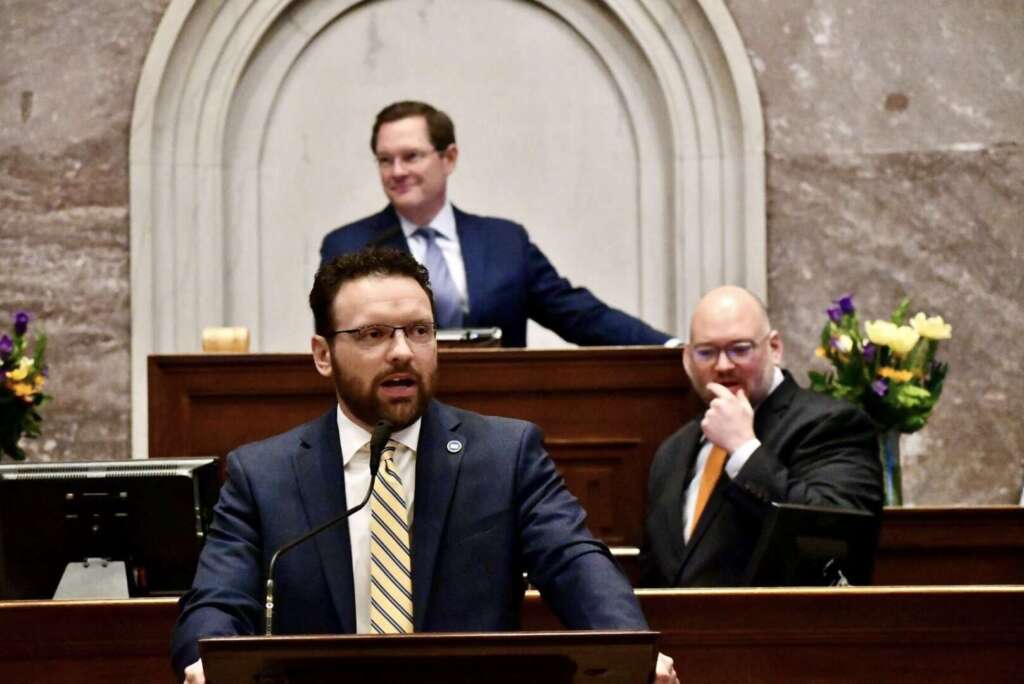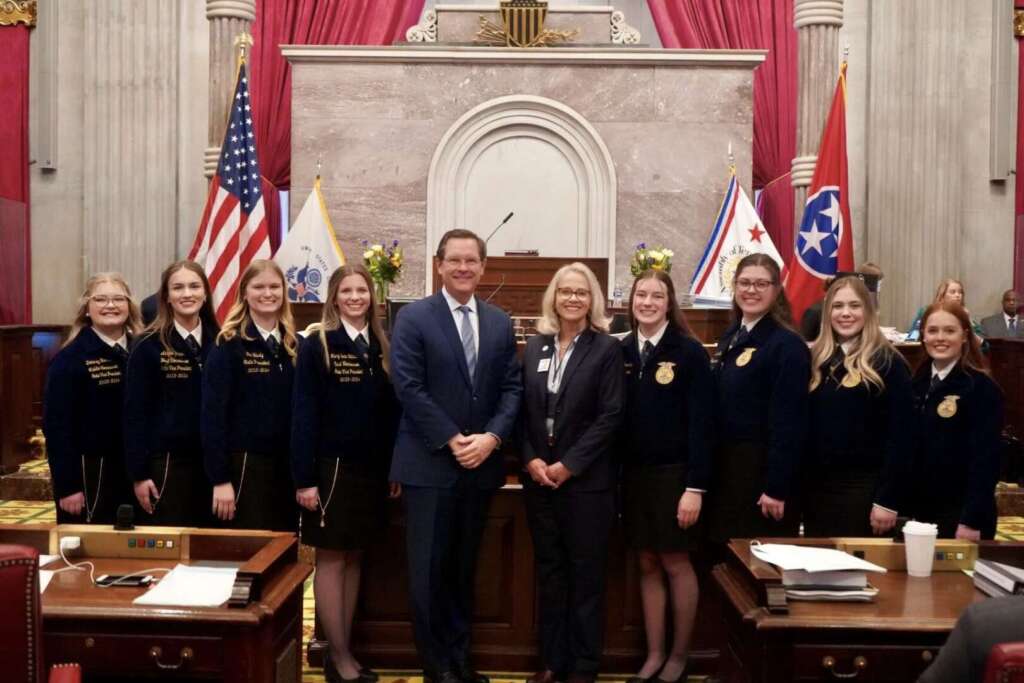House approves Duty to Warn Act to enhance public safety
The Tennessee House of Representatives this week approved Republican legislation to increase protections for those targeted by threats of violence.

House Bill 1625, also known as the Duty to Warn Act, requires mental health professionals and behavior analysts in Tennessee to inform local law enforcement if a patient makes an imminent threat to harm a specific individual or clearly identified group. Threats that are more general in nature must be reported to either the 988 Lifeline or a local crisis response service.
“This will strengthen duty to warn, provide some clarity and ensure that mental health practitioners do not have to call law enforcement when a patient makes a threat to them,” said bill sponsor State Rep. Jason Zachary, R-Knoxville.
The legislation includes protections from civil, criminal and disciplinary penalties for mental health professionals and behavior analysts who make reasonable attempts to comply with the law. The companion version of House Bill 1625 is still advancing through the Senate.
Legislation naming 10 official state books approved
The House chamber this week approved legislation naming the first 10 official state books for Tennessee.
House Bill 1828, sponsored by State Rep. Gino Bulso, R-Brentwood, highlights a collection of fiction and nonfiction works that are significant to the Volunteer State and its history.
“We’ve got state songs, state poems, state reptiles, but we have no official books,” Bulso said. “What we are doing (is recognizing) the rich cultural, literary and political heritage of our state dating all the way back to its beginning on June 1, 1796.”
The list includes:
- “Farewell Address to the American People” by George Washington (1796)
- “The Papers of Andrew Jackson”
- “Democracy in America” by Alexis de Tocqueville (1835, 1840)
- “All the King’s Men” by Robert Penn Warren (1947)
- “A Death in the Family” by James Agee (1958)
- “Roots” by Alex Haley (1977)
- “The Civil War: A Narrative” by Shelby Foote (1958-1974)
- “American Lion” by Jon Meacham (2009)
- “Coat of Many Colors” by Dolly Parton (2016)
- Aitken Bible (1782)
The companion version of House Bill 1828 is still advancing through the Senate.
House approves resolution denouncing neo-Nazis
A Republican resolution denouncing neo-Nazism and the National Socialist Movement was unanimously approved this week by the Tennessee House of Representatives.
House Joint Resolution 963, filed by House Majority Leader William Lamberth, R-Portland, commends Tennesseans for their strong opposition and unequivocal condemnation of hate groups.
Outrage erupted across the Volunteer State after a group of masked neo-Nazis carrying flags bearing swastikas marched through downtown Nashville on Feb. 17.
“We witnessed a vile display of hate by outsiders who wish to intimidate fellow Tennesseans. These groups do not represent Tennessee nor our shared values.” Lamberth said. “Tennesseans will never accept or normalize evil, and we denounce any ideology or group motivated by sick hatred and racial intolerance of any human being.”
The resolution condemns neo-Nazis who wish to incite violence and spread hate rooted in Holocaust-era fascist movements as well as socialism through their affiliation with the National Socialist Movement. It further rejects all who promote “anti-Semitism, xenophobia, discrimination and racial intolerance in all forms.”
House passes bill to regulate AI in education
The General Assembly this week passed legislation requiring schools to develop guidelines for the use of artificial intelligence (AI).
House Bill 1630, sponsored by State Rep. Scott Cepicky, R-Culleoka, would require the governing boards of public colleges and universities, public charter schools, and local boards of education to regulate the role and use of AI in each institution.
“What this bill does is tasks our… schools to come up with an artificial intelligence plan on how they’re going to allow our professors, our teachers and our students to use and not use artificial intelligence,” Cepicky said.
Schools will be required to craft a policy by the 2024-25 school year and submit it annually to the Tennessee Department of Education. The bill will now head to Gov. Bill Lee’s desk to be signed into law.
General Assembly names Cleveland the hot slaw capital of Tennessee
The General Assembly has passed legislation making hot slaw an official state food and designating Cleveland as hot slaw capital of Tennessee.
House Bill 1597 and House Bill 1598, both sponsored by State Rep. Kevin Raper, R-Cleveland, passed unanimously Thursday.

“This is an important day for our community,” Raper said. “I’m proud that Cleveland will now officially be the hot slaw capital of Tennessee. Like hot chicken in Nashville, barbeque in Memphis or Moon Pies in Chattanooga, hot slaw is unique to Cleveland’s story. This is an important step in preserving the history of our community and state.”
Hot slaw typically contains mustard, vinegar and hot pepper and is served cold. The dish was invented at Star Vue Drive-in Theatre in Cleveland, Tenn. and is now a staple in the community where it is served in more than two dozen local restaurants.
The Senate unanimously passed the bills earlier this month. They will now head to Gov. Bill Lee’s desk to be signed into law.
House approves bill prohibiting taxpayer-funded ransomware payments
The Tennessee House of Representatives this week approved Republican legislation to ensure state government agencies never pay ransoms to online criminals in the event of a cyberattack.
House Bill 1733, sponsored by House Majority Leader William Lamberth, R-Portland, prohibits all state entities from contracting, negotiating with or paying an individual or entity that is a known system hacker.
“This is a very clear and concise bill,” Lamberth said Thursday. “If some hacker out there anywhere in the world wants to try to ransom our data, our data is going to be backed up and protected and you will not get paid if you try to hijack the people of Tennessee.”
Cybercriminals have increasingly targeted federal and state governments across the nation in recent years, attacking critical emergency alert systems and stealing citizens’ private data. These disruptions are costly and recovery of the data can be challenging. The companion version of House Bill 1733 is still advancing through the Senate.
Legislation would expand newborn safe haven program
A proposal to expand the availability of Safe Haven Baby Boxes for newborns in Tennessee advanced this week in the House.
House Bill 2067, introduced by State Rep. Ed Butler, R-Rickman, would require the Department of Children’s Services to issue grants to counties for the installation of newborn safety devices while House Bill 1922 would add assisted living facilities, nursing homes and emergency communications centers to the list of approved locations for the devices.
The legislation will expand “the opportunity for a woman to safely give up her baby, whether it’s at a Safe Haven Baby Box or whether it’s at a safe haven location,” Butler said, adding the intent is to “save babies’ lives.”
Since 2001, Tennessee’s Safe Haven law has allowed mothers in certain cases to surrender their newborn without fear of being prosecuted. The child must be no more than 14 days old, unharmed and left voluntarily.
The General Assembly previously approved legislation in 2022 that expands the state’s safe haven law by allowing for the installation of Safe Haven Baby Boxes at police and fire stations in Tennessee.
House Bill 2067 is scheduled to be heard in the Civil Justice Committee on Feb. 28 while House Bill 1922 is scheduled to be heard in the Health Committee on the same day.
Legislation to increase adult-sized changing table availability advances
The House Health Subcommittee on Tuesday advanced Republican legislation aimed at increasing the availability of publicly available adult-sized changing tables in Tennessee.
House Bill 2690, sponsored by State Rep. Clay Doggett, R-Pulaski, would allow the Department of Intellectual and Developmental Disabilities to increase grant amounts from $5,000 to $10,000 to support the installation of powered, height-adjustable, adult-sized changing tables in public restrooms statewide.
“We’ve worked through the appropriation process… but we had to have something in legislation that could authorize the Department of Intellectual and Developmental Disabilities to be able to handle those funds and get those grants out into the public,” Doggett said Tuesday.
The legislation also allows for the creation of an ad-hoc committee to advise and assist with grant applications.
The General Assembly in 2022 allocated $1 million in state funding to expand the availability of adult-sized changing tables in public restrooms in Tennessee. House Bill 2690 is scheduled to be heard in the Health Committee on Feb. 28.
Bill increasing support for victims of child sex trafficking advances
Legislation that would significantly increase the time victims of child commercial sex trafficking could file a civil lawsuit against their attacker advanced this week in the House.
House Bill 1906, introduced by State Rep. Jake McCalmon, R-Franklin, would allow victims to sue up to 30 years after they turned 18 for any injuries or illnesses that occurred as a result of the sexual abuse. The law currently allows victims to pursue civil action against an alleged perpetrator up to 15 years after they turn 18.
“These horrific events often traumatize victims for the rest of their lives,” McCalmon said. “Victims deserve accountability and the opportunity for justice. Tennessee Republicans are committed to ensuring those who viciously prey on the most vulnerable members of society are held responsible for their actions and severely punished.”
House Bill 1906 is scheduled to be heard in the House Civil Justice Committee on Feb. 28.
House advances Smart Heart Act
Legislation to ensure an automatic electronic defibrillator (AED) is easily accessible during high school sporting events advanced out of the House K-12 Subcommittee this week.

The Smart Heart Act, sponsored by State Rep. Scott Cepicky, R-Culleoka, would require public and nonpublic schools that serve grades nine through 12 to have an AED accessible during the school day as well as during athletic activities students participate in at the school.
“We’ve already done something on this with our high schools,” Cepicky said Tuesday about the proposed legislation. “This further brings that into our sports facilities, making sure that we have the quick response time in case a heart would stop on one of our athletes we can have an automatic electronic defibrillator there within three minutes to save the life of that student.”
The legislation would require districts to develop a cardiac emergency response plan as well as an athletics emergency action plan for when a student suffers a serious or life-threatening injury while participating in school youth athletic activities. Coaches and school athletic directors must also have annual training in cardiopulmonary resuscitation, first aid and how to properly use an AED. House Bill 2251 is scheduled to be heard in the Education Administration Committee on Feb. 28.
400 Reward schools, 12 Exemplary districts named statewide
The Tennessee Department of Education (TDOE) this week announced state school and district designations for the 2022-23 school year.
A total of 400 Reward schools and 12 Exemplary districts across the state received the designations based on various performance indicators, including student achievement and growth.
The complete list of schools can be found on the TDOE’s district and school accountability website. The 12 Exemplary school districts include:
- Bells City Schools
- Bledsoe County Schools
- Bradford Special School District
- Dyer County Schools
- Dyersburg City Schools
- Franklin Special School District
- Gibson County Special School District
- Johnson City Schools
- Rogersville City School
- Sweetwater City Schools
- Tennessee School for the Deaf
- Trousdale County Schools
Each year, schools and districts are eligible for designations based on their overall performance across indicators that are essential to student success, including how they prepared students to be proficient, accelerated student learning, encouraged students to attend school regularly, prepared students for postsecondary success and supported English learners acquiring language skills.
Schools are recognized as a Reward school when they demonstrate high levels of performance and/or improvement in performance by meeting objectives across performance indicators and student groups, and the Reward school distinction places significant emphasis on performance and improvement across all indicators from the prior school year.
Districts are recognized as an Exemplary District when they receive an overall district performance score of 3.1 or higher on a 4.0-point scale across all performance indicators as referenced above.
Briefly…

License plate concealment: House Bill 2145, filed by State Rep. Greg Martin, R-Hamilton County, would make the manufacture and sale of license plate flippers a Class A misdemeanor in Tennessee. The purchase and possession of the device would also be a Class B misdemeanor. Plate flippers, which allow drivers to switch between their legitimate plate and a blank space or expired plate, are sold in several physical and online retailers. Concealment of a license plate is currently a Class C misdemeanor in Tennessee. House Bill 2145 is scheduled to be heard in the Finance, Ways and Means Subcommittee on Feb. 28.
Opportunities for engineers: House Bill 2578, introduced by Deputy Speaker Curtis Johnson, R-Clarksville, seeks to increase the number of engineers in Tennessee. The legislation would allow graduates of an unaccredited engineering technology program to become a certified engineer if certain requirements are met. House Bill 2578 is scheduled to be heard in the Commerce Committee on Feb. 27.
Obscene materials: House Bill 2159, sponsored by State Rep. Jody Barrett, R-Dickson, would allow individuals and entities to be held civilly liable for producing, selling, sending or distributing obscene material in Tennessee. The legislation will also give parents and other concerned individuals the opportunity to stop the distribution of this already illegal material. House Bill 2159 is scheduled to be heard in the Criminal Justice Committee on Feb. 27.
Critical infrastructure vandalism: House Bill 2265, sponsored by State Rep. Clark Boyd, R-Lebanon, would expand critical infrastructure vandalism crimes to include cyberattacks. The General Assembly last year increased the penalty for attacking critical infrastructure to a Class C felony. House Bill 2265 is scheduled to be voted on by the House chamber next week.
Food sales tax break: House Bill 2044, sponsored by State Rep. Monty Fritts, R-Kingston, would eliminate the state sales tax for retail sales of food eligible under the Special Supplemental Food Program for Women, Infants and Children (WIC). Items include fresh and frozen fruits and vegetables, certain bread items, cereals, milk, eggs and juice, among others. House Bill 2044 has been placed behind the budget and will be considered for funding at a later date.
School safety: House Bill 2142, sponsored by State Rep. Greg Martin, R-Hamilton County, would improve safety and student achievement in schools by ensuring transparency in disclosing delinquent histories. The bill would clarify that schools must ask parents if a student is an adjudicated juvenile offender for certain serious acts, meaning a judge has found them responsible in juvenile court. It would also strengthen the penalty for parents knowingly failing to disclose this information.
Election day school closures: The Tennessee House of Representatives this week approved Republican legislation aimed at improving school safety during elections. House Bill 1649, sponsored by State Rep. Jake McCalmon, R-Franklin, requires public schools to be closed for instruction if the building is being used as a polling place for a presidential election primary. Schools used as polling locations for the November general election are already required to be closed. The companion version of House Bill 1649 is still advancing through the Senate.
Christian Heritage Month: House Bill 2125, sponsored by State Rep. Rusty Grills, R-Newbern, would designate November as Christian Heritage Month in Tennessee. The legislation is scheduled to be heard in the State Government Committee on Feb. 28.
State songs: House Bill 1613, which names “Rockin’ Around the Christmas Tree” by Brenda Lee as the official state holiday song for Tennessee, was approved by the House chamber this week. The companion version of the bill is still advancing through the Senate. Separately, House Bill 2006, sponsored by State Rep. Kirk Haston, R-Lobelville, would add “Tennessee, Tennessee” by Wayne Jerrolds to the list of official state songs. Tennessee currently has 14 state songs. House Bill 2006 is scheduled to be heard in the House State Government Committee on Feb. 28.
Protecting children: House Bill 2163, filed by State Rep. Mary Littleton, R-Dickson, would add computer-generated images that are created, adapted or modified by artificial intelligence to the list of materials that are covered by the state’s laws dealing with sexual exploitation of children. The legislation is scheduled to be heard in the Criminal Justice Committee on Feb. 27.
###


